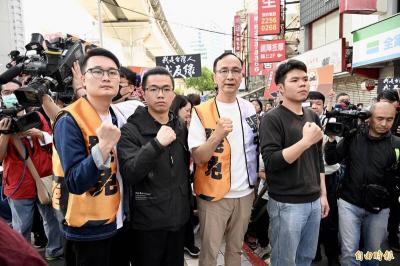In a bid to lend substance to an otherwise ethereal provision of the Constitution, the legislature yesterday reviewed the draft Initiative and Referendum law (
The legislature's Home and Nations, Judicial and Organic Laws and Statutes committees yesterday jointly reviewed three draft proposals of the law, which would institute a procedure for citizens to establish a new Constitution if it passes muster with the legislature.
According to Article 17 of the Constitution, the people shall have the right of election, recall, initiative and referendum, while Article 136 states that the exercise of the rights of initiative and referendum shall be prescribed by law.
The three proposals, submitted by the Executive Yuan and DPP Legislator Chen Chin-de (
The Executive Yuan's proposal states that the Ministry of the Interior is entitled to set up a committee to review referendum applications, to the exclusion of diplomatic, military, national security, budget, and social welfare policies.
Independent Legislator Sisy Chen (
"The country would be totally shut down if this proposal becomes law," Chen said at the meeting.
Chen argued that important policies of major national concern, such as the inauguration of nuclear power plants, could be abandoned as citizens would be entitled to hold referendums over any construction project which they disliked.
Minister of the Interior Yu Cheng-hsien (余政憲) gave no answer to PFP Legislator Chou Hsi-wei's (周錫偉) question about the standards the ministry's committee would use to approve a referendum.
DPP Legislator Lin Cho-shui (
"We should use the law to solve problems that can't be solved by the existing administrative and legislative system," Lin said.
He added that the law would provide a framework for citizens to establish a new Constitution, should they wish to do so.
A similar idea was expressed by former president Lee Teng-hui (
The meeting failed to complete the review yesterday, but the three committees are expected to schedule another review. Another referendum law proposal, submitted by DPP Legislator Trong Chai (蔡同榮) was boycotted by the pan-blue camp last week, which said the bill would upset China.

The Ministry of Economic Affairs has fined Taobao NT$1.2 million (US$36,900) for advertisements that exceeded its approved business scope and ordered the Chinese e-commerce platform to make corrections in the first half of this year or its license would be revoked. Lawmakers have called for stricter supervision of Chinese e-commerce platforms and more stringent measures to prevent China from laundering its goods through Taiwan as US President Donald Trump’s administration cracks down on origin laundering. The legislature’s Finance Committee yesterday met to discuss policies to prevent China from dumping goods in Taiwan, inviting government agencies to report on the matter. Democratic Progressive Party

Taiwan and its Pacific ally Tuvalu on Tuesday signed two accords aimed at facilitating bilateral cooperation on labor affairs, according to Taiwan’s Ministry of Foreign Affairs (MOFA). The governments inked two agreements in Taipei, witnessed by Foreign Minister Lin Chia-lung (林佳龍) and visiting Deputy Tuvaluan Prime Minister Panapasi Nelesone, MOFA said in a news release. According to MOFA, the agreements will facilitate cooperation on labor issues and allow the two sides to mutually recognize seafarers’ certificates and related training. Taiwan would also continue to collaborate with Tuvalu across various fields to promote economic prosperity as well as the well-being of their

The Taipei District Prosecutors’ Office has continued its investigation into allegations of forged signatures in recall efforts today by searching the Chinese Nationalist Party’s (KMT) city chapter and questioning several personnel including the chapter director, according to media reports. Among those questioned and detained were KMT Taipei chapter director Huang Lu Chin-ju (黃呂錦茹), chapter secretary-general Chu Wen-ching (初文卿), chapter secretary Yao Fu-wen (姚富文) and first district committee executive director Tseng Fan-chuan (曾繁川). Prosecutors said they would not confirm reports about who had been summoned. The investigation centers on allegations that the ongoing recall campaigns targeting Democratic Progressive Party legislators Rosalia Wu (吳思瑤)

Several Chinese Nationalist Party (KMT) officials including Chairman Eric Chu (朱立倫) are to be summoned for questioning and then transferred to prosecutors for holding an illegal assembly in Taipei last night, the Taipei Police said today. Chu and two others hosted an illegal assembly and are to be requested to explain their actions, the Taipei City Police Department's Zhongzheng (中正) First Precinct said, referring to a protest held after Huang Lu Chin-ju (黃呂錦茹), KMT Taipei's chapter director, and several other KMT staffers were questioned for alleged signature forgery in recall petitions against Democratic Progressive Party (DPP) legislators. Taipei prosecutors had filed